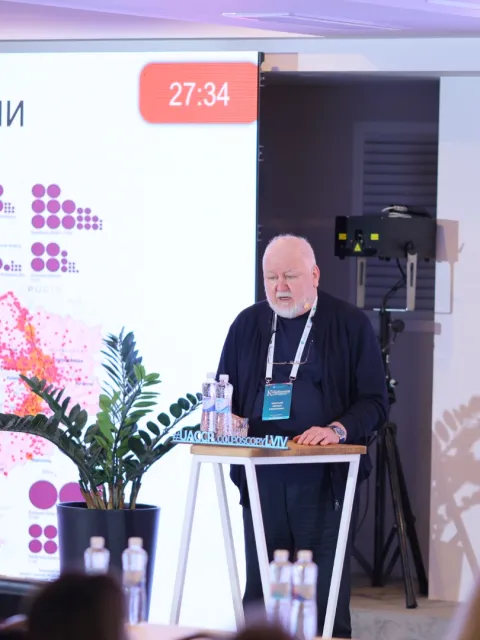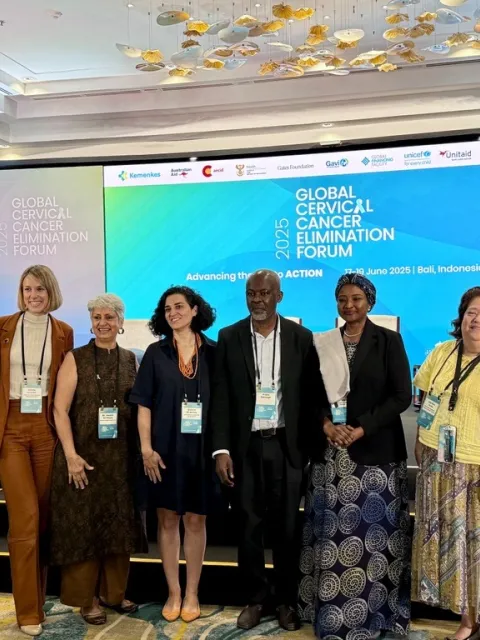Cancer civil society engagement is critical for reaching the 90% target for HPV vaccination
UICC study reveals the role of cancer civil society in LMICs as well as the challenges they face in supporting cervical cancer elimination efforts, notably in expanding HPV vaccination.

HIGHLIGHTS
- Two-thirds of the survey participants (civil society organisations (CSOs) within UICC's membership) responded that they actively engage in HPV vaccination efforts, focusing on advocacy, awareness-raising, and community mobilisation. While 97% are involved in advocacy, only 21% directly contribute to vaccine delivery.
- CSOs encounter external challenges such as vaccine hesitancy and misinformation, alongside internal obstacles like insufficient data and budget constraints. Access to vaccines, particularly in low-income settings, remains a significant barrier.
- CSOs require support in areas like peer-to-peer learning, effective communication strategies, and organisational management skills. Ensuring access to grants and technical assistance for programme design and impact assessment is crucial to their role in achieving the 2030 cervical cancer elimination targets.
As part of its focus on women’s cancers and in support of national efforts to eliminate cervical cancer, UICC conducted a landscaping of the role of civil society organisations (CSOs) in HPV vaccination. Cervical cancer claims a woman’s life every two minutes, with 90% of all related cases and deaths occurring in low- and middle-income countries (LMICs).
The consultation revealed the key role that CSOs play in supporting the introduction and scale up of HPV vaccination, with a particular emphasis on advocacy, awareness-raising and community mobilisation. It also highlighted the important challenges that CSOs face in supporting the cervical cancer elimination agenda as outlined in WHO’s Global Strategy to eliminate cervical cancer.
The consultation was conducted with a mixed methods approach, collecting more than 100 survey responses alongside 50 in-depth interviews. The objective was to better understand cancer civil society organisations’ engagement, roles, specific activities as well as barriers they face and their needs in the field of HPV vaccination, in low- and middle-income countries.
"This landscaping was a unique opportunity to gather the views of CSOs as well as key stakeholders from UICC's community. It highlights their invaluable engagement in increasing access and uptake of the HPV vaccine. It is critical that this role is recognised and supported in ongoing efforts towards cervical cancer elimination.”
– Mélanie Samson, Senior Manager, Capacity Building
According to the survey, focused on CSOs within UICC’s membership, 66% of respondents indicated they were engaged in activities relating to HPV vaccination and cervical cancer elimination. Most organisations are also involved in advocacy (97%), awareness-raising (92%) and community mobilisation (69%); only 21% take part directly in vaccine delivery.
Among those not currently engaged, 23% expressed willingness to engage, and 11% opted out. Lack of funding (50%), other organisational priorities (28%), and insufficient knowledge in the area (22%) were the main reasons cited for non-engagement.
Both the survey and the qualitative interviews showed that CSOs are key players in efforts to eliminate cervical cancer, including for accompanying the roll-out and uptake of HPV vaccination. A notable strength is their understanding of community needs. They have first-hand knowledge of local challenges, perceptions and opportunities; they play pivotal roles in engaging with all stakeholders and populations to sustainably facilitate reaching the 90% target; and they are considered trusted and objective actors, who can navigate cultural dynamics efficiently.
Public awareness is pivotal, with 92% of CSOs involved in educational campaigns to counter misinformation and vaccine hesitancy. These campaigns also tackle stigma associated with the HPV vaccine, especially from a gender perspective.
Specifically, they complement efforts by public authorities, particularly in reaching geographically or culturally isolated communities. Many work closely with governmental agencies to facilitate vaccine roll-outs, and their localised efforts and deep community roots make them vital players in the success and sustainability of vaccination programmes.
Yet they face several challenges, both external and internal, in carrying out their activities related to HPV vaccination as part of cervical cancer elimination.
On the external front, these include vaccine hesitancy and a lack of information among the population, associated with stigma and misconceptions surrounding the HPV vaccine; insufficient data; fragmentation among funders and stakeholders; and access to vaccines. In some countries, lack of vaccine availability or affordability was a significant factor affecting the level of CSO engagement in low-income settings.
A lack of reliable data to inform programme planning, human resources and communication between stakeholders involved in supporting HPV vaccination, as well as budgetary constraints and a need to further develop wider organisational and programme management skills were also cited as internal obstacles to their involvement.
From the landscaping, it was also evident where the CSOs would benefit the most from support, notably in opportunities for peer-to-peer learning and the sharing of knowledge and experience, but equally in developing effective communication strategies, organisational management skills to ensure sustainability, grants and technical assistance (programme design and impact assessment, implementation, and tools for specific audiences, such as health professionals, youth and leaders of organisations).
“Achieving the 90:70:90 targets for cervical cancer elimination by 2030 will require an orchestrated effort that mobilises all stakeholders - CSOs stand out as invaluable players, who must be supported in their efforts to overcome the challenges they face in order to optimally leverage their knowledge and engagement.”
– Kirstie Graham, Director of Capacity Building
Last update
Thursday 16 November 2023
